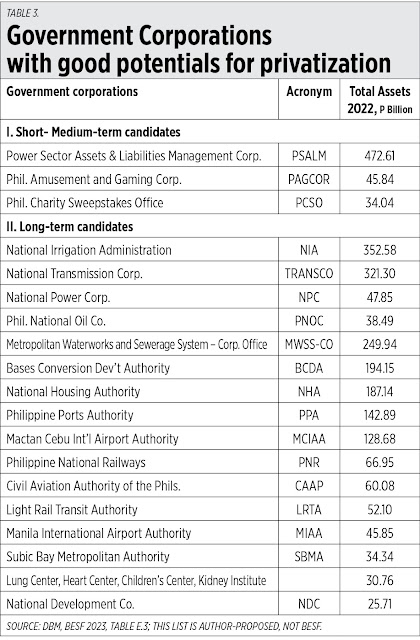Power demonopolization, privatization, and smuggling
* My article in BusinessWorld last September 19.
----------------
Last week, on Sept. 12, the National Grid Corp. of the Philippines (NGCP) made a big announcement of red and yellow alerts in the Luzon grid. It was a bad situation for three reasons.
One, it came just five days after a successful business roadshow by the Marcos Jr. administration in Jakarta and Singapore where some $14.4 billion of pledged investments to the Philippines were announced. When those big foreign investments come, they will need a huge power supply and yet the Philippines still experiences yellow-red alerts of thin power reserves and potential blackouts until now....
In many countries in Europe, the inconvenient fact is that as more wind and solar are added to the grid, overall power generation declines, and GDP growth is low and anemic. This is because many non-intermittent and reliable fossil fuel and nuclear plants exit the market as they are not a priority in the grid and are being demonized regularly.
The opposite occurs in East Asia. In the ASEAN-5 especially, wind-solar share remains low in the total generation mix and countries grow fast (see Table 2). We should keep business as usual, have more fossil fuel plants and limit the share of intermittent sources in the grid.
And then there are these two related reports in BusinessWorld: “DoE’s Lotilla says gov’t involvement in power will not bring rates down” (Sept. 8), and “Consistent application sought for key ERC ruling” (Sept. 15). I express my support for the positions taken by Energy Secretary Raphael Lotilla, and by ACEN Corp. that any ERC ruling on the SMC power companies’ petition for a rate hike must apply to all other players that will seek similar petitions.
On the budget, taxes, and borrowings for 2023, there is one important revenue source to pay the P2+ trillion/year of net borrowings from 2020 to around 2024: privatize many government corporations and other assets. I propose three state enterprises that must be prioritized for privatization, and nearly 20 others over the long-term (see Table 3). Government-owned power plants and gambling companies should be at the top of the list. There is zero market failure being addressed by these state enterprises, they remain simply due to politics.
Finally, related to a recent piece in this column, “Motorcycle taxis, illicit tobacco, and electric cooperatives” (Aug. 8) where I noted that the estimated value of foregone tobacco taxes due to smuggling is P24-49 billion/year, House Bill (HB) 3917 was filed amending the Anti-Agricultural Smuggling Act of 2016 to classify cigarette smuggling as “economic sabotage” and imposing higher fines and penalties, and imprisonment.
This is a good bill authored by Ilocos Norte Representative Ferdinand “Sandro” Marcos and Party-list Representative Margarita “Migs” Nograles. The anti-smoking NGOs and activists should support moves to fight illicit tobacco because smuggled cigarettes are so cheap — the retail prices are lower than the tax alone of P55/pack this year — that they encourage more smoking, not less.
When tax avoidance and smuggling are controlled, there will be less need to raise taxes elsewhere.





Comments
Post a Comment